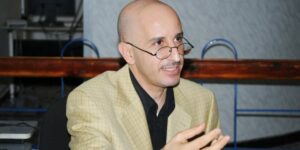


Leading expert on Sufism, Said Djabelkhir
Saïd Djabelkhir is a leading expert on Sufism, and the founder of Cercle des Lumières pour la pensée libre (Circle of Enlightenment for Free Thought) an association for thinkers and academics who are advocating a progressive Islam. Djabelkhir’s conviction on charges of “offending the precepts of Islam” was overturned on 1 February 2023.
History of the case
2023
February
On 1 February 2023, the Court of Algiers quashed his conviction.
2021
April
Djabelkhir’s trial takes place before the Sidi Mhamed first instance court on 1 April 2021. According to Amnesty International, he was not informed of his trial date.
Djabelkhir was convicted of violating Article 144 bis 2 on 22 April and sentenced to 3 years in prison, as well as a fine of 50,000 Dinars (approx. US$375). He remains free pending appeal.
February
Djabelkhir is summoned to court after a fellow academic files a complaint that his writings constituted “an attack and mockery of the authentic hadiths of the Sunna [the custom and practice] of the Prophet,” and had caused individuals psychological harm.
2020
January
In a series of Facebook posts made in January 2020, Djabelkheir draws comparisons between Eid al-Adha and the Berber New Year celebrations; refers to some stories in the Quran as ‘myths’; and says he considers some hadiths ‘apocryphal’.
That same month, Djabelkhir learns through friends that he is being investigated under Article 144 bis of the Algerian Penal Code. He has not been formally notified of the investigation.
Background information
Saïd Djabelkhir is a leading expert on Sufism, and the founder of Cercle des Lumières pour la pensée libre (Circle of Enlightenment for Free Thought) an association for thinkers and academics who are advocating a progressive Islam. After his graduation in Islamic studies at the University of Algiers, Saïd Djabelkhir taught Arabic language and philosophy for several years in middle and high schools.
In 2000, he began his career as a cultural editor of many Algerian newspapers such as Al Fadjr, El Djazair and Echorouk El Yawmi. He also worked for Arab newspapers such as the UAE daily Khaleej Times where he was editor of the cultural section.
Djabelkhir is also known in Algeria as a radio and tv personality where he used to work for (Alger Chaîne 1 radio) for four years as producer and host of eight cultural programs, including “Nass el Hadhra,” a program on Sufi music and poetry. Between 2011-2012 he was producer and host of the Sufism section on the Algerian television channel “Canal Algérie”.
Djabelkhir published several books in Arabic and French on Sufism and Islam, including: Sufim and creation (El Mahroussa, Cairo 2007), Sufism, religion and religious referent (Fairouz, 2010), and The Sufi Confraternities in Algeria, (Fairouz, Algeria 2011).
Country Background
As declared in the constitution, Algeria is a Sunni Islamic State. The Constitution bans non-Muslims from holding high-level government positions. Non-religious groups meet in secret to avoid state persecution and social approbation. Those who “renounce” Islam may be imprisoned, fined, or co-erced to re-convert. Algeria is a member of the UN Human Rights Council since 2014, yet most human rights experts and international NGOs are still denied access to the country. Algeria is a member of the League of Arab States (LAS), as well as the Organization of Islamic Cooperation (OIC).
Freedom of expression, advocacy of humanist values
The “blasphemy” law is stringent and widely enforced. The non-religious are largely invisible in the public sphere, and although not specifically targeted through legislation, significant prejudice towards non-Muslim religions can be presumed to apply equally if not more so to non-believers.
“Blasphemy” is prohibited through several legal instruments. The penal code prohibits insults against Islam or the Prophet Muhammad, and this is reinforced in media legislation.
The crime of “blasphemy” carries a maximum of five years in prison and the laws are interpreted widely. For example, several arrests have been made under the blasphemy laws in the last few years for failure to fast during Ramadan, even though this is not a requirement under Algerian law. Non-fasting persons (“non-jeûneurs”) repeatedly face harassment by the police and civil society.
Public protests for freedom of conscience and the right to abstain from fasting (including many secular Amazigh movements) have triggered a public debate in which some leaders of the Islamist movement have demanded the death penalty for the failure to fast during Ramadan.
Beside Ramadan, alcohol consumption, which is prohibited by religious law, has been put under increased controls and has lead to forced closure of several bars since 2012.
Since 2006, proselytizing by non-Muslims has been illegal and carries a fine of up to EUR 10,000 and a maximum of five years in prison and non-Muslim missionary groups are only allowed to conduct humanitarian activities. Distribution of materials which may “shake the faith” of a Muslim or “undermine the Islamic faith” is also prohibited.
Apostasy is not expressly penalized, but draws consequences partially in the family law.
Humanists International’s concerns & calls
Humanists International believes that Saïd Djabelkhir is being targeted solely for peacefully exercising his rights to freedom of religion or belief and freedom of expression, and calls for the Algerian authorities to quash his conviction.
Humanists International’s work to support Djabelkir
Humanists International is currently campaigning for the case against Djabelkhir to be quashed.
